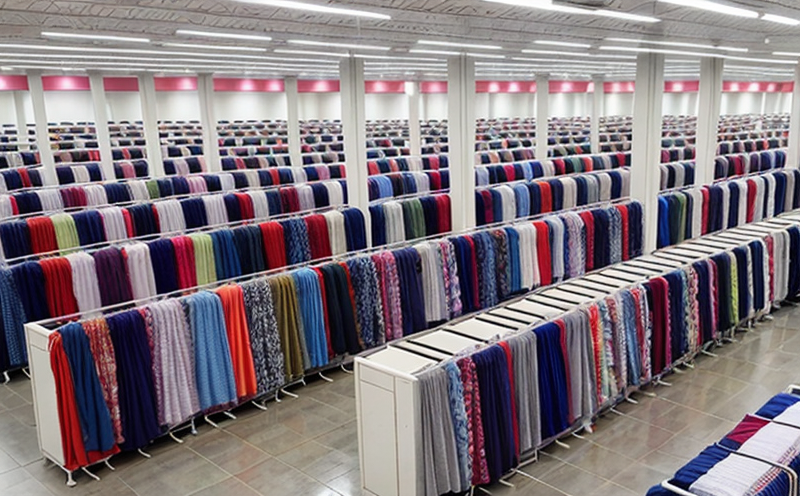ISO 14184 Formaldehyde Content Testing in Apparel for Export
The ISO 14184 standard is a critical benchmark for ensuring that formaldehyde content in textiles and apparel does not exceed safe levels, thereby protecting the health of consumers. This test is particularly crucial for government and trade facilitation sectors where export standards are stringent.
Formaldehyde can be used as a preservative or to improve fabric properties such as shrinkage resistance, crease resistance, and softness. However, high concentrations can pose risks including skin irritation, respiratory issues, and potential cancer risks. The ISO 14184 standard sets limits on the amount of formaldehyde that should be present in textiles and apparel intended for sale or distribution to consumers.
Our laboratory adheres strictly to the requirements outlined in ISO 14184:2016, which specifies a test method for determining the total content of free and uncombined formaldehyde in textile materials. This includes both water-soluble and water-insoluble forms of formaldehyde.
The testing process involves several steps:
- Sample preparation
- Immersion in distilled water
- Dissolution of formaldehyde
- Measurement using a spectrophotometer or other approved analytical instruments
The results are reported as the concentration of free and uncombined formaldehyde present in the textile. Compliance with ISO 14184 ensures that products meet international safety standards, which is essential for export to countries like the United States, Canada, Japan, and Europe.
Our team of experts ensures accurate testing by leveraging advanced analytical techniques and adhering strictly to industry best practices. We provide detailed reports that include all relevant data points necessary for compliance with regulatory requirements.
| Country | Regulatory Requirement (mg/kg) |
|---|---|
| United States (Consumer Product Safety Commission) | <70 ppm for children's clothing, <350 ppm for other garments |
| Canada (Health Canada) | <70 ppm for children's clothing, <350 ppm for other garments |
| Japan (Ministry of Health, Labor and Welfare) | <70 ppm for children's clothing, <200 ppm for other garments |
The table above outlines the regulatory requirements in key exporting markets. Compliance with these standards is not only a legal requirement but also essential for maintaining consumer trust and protecting brand reputation.
Our service ensures that your products meet or exceed international safety standards, thereby facilitating smoother trade processes and reducing the risk of non-compliance penalties.
Industry Applications
- Clothing Manufacturing: Ensures compliance with export regulations on formaldehyde content in clothing items.
- Textile Mills: Provides data to support the quality control of textiles before they are processed into finished garments.
- Apparel Exporters: Helps exporters ensure that their products meet international safety standards, which is crucial for maintaining trade relationships and avoiding recalls or bans.
The ISO 14184 test plays a vital role in the textile and apparel industry by ensuring product safety. This is especially important when exporting to countries with stringent formaldehyde regulations. By adhering to this standard, manufacturers can protect consumer health while also enhancing their brand reputation.
International Acceptance and Recognition
The ISO 14184:2016 standard is widely recognized internationally for its robust approach to assessing formaldehyde content in textiles. This international acceptance extends across numerous countries including the United States, Canada, Japan, Australia, and many European Union member states.
Countries often adopt standards from reputable organizations like ISO to ensure consistency and reliability. The adoption of ISO 14184 indicates a commitment to consumer safety and environmental protection. By offering this service, we contribute to global trade by helping exporters meet these stringent requirements.
Our laboratory is equipped with state-of-the-art equipment and skilled personnel who are trained in the latest testing methodologies. This ensures that our clients receive accurate and reliable results every time.
Competitive Advantage and Market Impact
Compliance with ISO 14184 can provide significant competitive advantages for textile and apparel exporters. By ensuring product safety, you demonstrate a commitment to quality and consumer well-being. This can enhance your brand's reputation and foster customer trust.
In the global market, where regulatory compliance is increasingly important, meeting these standards can open up new markets and opportunities. Consumers are becoming more health-conscious, and companies that prioritize safety and quality are likely to see increased demand for their products.
Moreover, adherence to international standards like ISO 14184 can help reduce the risk of product recalls or bans, which could otherwise result in significant financial losses. It also simplifies the regulatory approval process, making it easier for your products to enter new markets.





